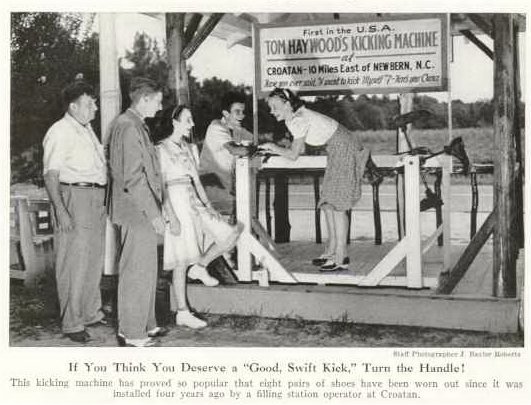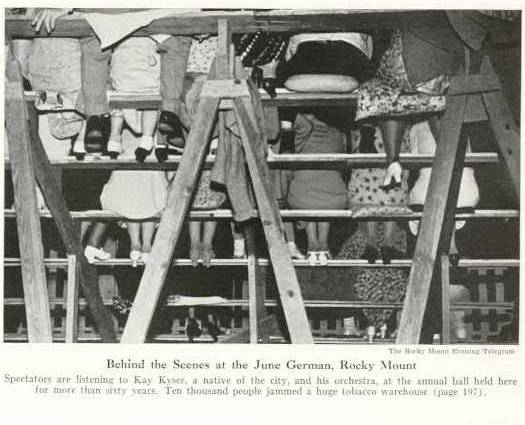![]()
The Charlotte News
Wednesday, July 13, 1938
FIVE EDITORIALS
![]()
![]()
Site Ed. Note: For your edification, from National Geographic, August, 1941:


Why here? you may ask. Why not? we may respond.
And t'others of the date. (Incidentally, that you don't become snobbishly mesmerized in Dodge by all the checkered print in this day's passing tumbril, Richard Whitney, (not to be confused with Dick Whittington and his commodity-valued cat), was the fellow on the Board of Governors of the N. Y. Stock Exchange indicted and convicted for extensive securities fraud, brokering money held in public trust for his private stock gambling enterprise, among other things. Also, re the letter writer on the Hippodrome's alternately dragooned and flagoned customers, we note that perhaps part of the misperception of the Christian Scientists might have something to do with the adoption of a particular word in the quoted principle of equanimity and otherwise mental temperance to represent a notion, utilizing a connotation more at the original latin animating spirit of it, which nevertheless runs exactly counter to its usual contextual usage in ordinary modern discourse. Now where did our little spaniel go? Oh, there you are, chewing on the cloth coat again.)
![]()
Row, Boys, Row!
Up in our chromium-plated tower with the air-conditioning machinery noiselessly and effortlessly keeping the temperature at a mean 92, we've been sitting sitting thinking how the Pres-by-ter-i-ans got the jack and left the doctors to their ap-prehensions. How the doctors, 90 doctors, slightly vexed at David's "Nix," have appealed to Friendly Ben, who appealed to Mr. Ickes, for a hospital.
And all we have to do, it seems, to get this institution--provided lawyers certify it's in the constitution--is to raise a quarter-million by popular subscription and furnish Mr. Ickes with an architect's description of a hospital.
Which is fine, and we could use it, but it's row, boys, row! For, after all this cash gives out there may not be any mo'. The deadline for such projects is but 80 days away,* and after that thumbs go down at PWA on our hospital.
*[Note: Since haste is the essence of this newest spending-lending program, it has been specified that applications for loans and grants must be in by September 30; actual work under way by January 1, 1939.--Editors, The News.]
![]()
A Grudge Is Paid
One of the most audacious journalistic ventures to come to our attention in many a moon is encompassed in the series of articles by Harry Ashmore of Greenville which starts today in The News. What he has done is to go smack into the lair of the most blatant critic of the South--J. David Stern's Philadelphia Record--and deliberately look for the worst he could find. He found it.
He found the worst precisely as Leeds Moberley, Philadelphia Record reporter, found the worst in the South when he came hurriedly through this section on the ostensible mission, as his paper put it, of getting an "unbiased" picture of the industrial South, hence an alibi for the industrial migration away from Pennsylvania. Like Ashmore's, Moberley's account was, we take it, truthful, after a fashion. But it was incomplete and misleading and infuriating. The fellow had looked upon pigsties and deftly left the impression, without actually saying it, that they made up the entire Southern landscape.
And Ashmore has paid him back in his own coin, with interest, and it's grimly satisfying reading. By all means read it, but with this reservation--that it pretends to be no more a complete picture of the Deep North than that of the South which baited it into existence.
![]()
A Political Prisoner
The charge on which a judge in New York State yesterday handed out a year's prison term to one incorporator of a German-American Volksbund and $500 fines to five others was that they had got themselves up an organization bound by secret oath and had neglected to file lists of their members and officers, as the law requires, with the secretary of state. One witness for the prosecution, a former Bund member, testified that he had taken a secret oath on joining; but all the rest testified that they had not. The jury held with the one in the record time of two minutes.
These, mind you, are unlovely people, and they have no real right to the freedom that is theirs in America. They hate and would persecute Jews and would deny to any suspected Communist the freedom of opinion which they claim for themselves. They revere Hitler above all other mortals, and pretty evidently they place Nazism far ahead of Americanism as we know it and try to practice it.
But it is we, the run-of-mine Americans who believe in civil liberties and freedom of speech and assembly and the press and the individual--it is we, not they, who are the custodians of this Americanism. If any part of the judgment against them is for not behaving as Americans should, and there is pretty good evidence that that explains both the verdict and the severity of the penalties, then it is we who have been irresponsible to our trust and put a man in jail for his political beliefs. They--they don't matter.
![]()
Amendment to a Scheme
Trouble with the scheme cooked up yesterday by Claire Shadwell, the American Legion, et al.,--is only that it doesn't go far enough. Heaven knows, Charlotte, like most other burgs American, is in need of a downtown chalet de necessite, discreetly altered a bit from the French model. And certainly, the lower end of the old cemetery back of the First Presbyterian Church, lying completely unused by either the dead or the living, and already belonging to the City, seems a good enough place to locate it.
But why stop with asking WPA to pay for the little house and for "beautifying the adjoining property"? Since we are about the nicking of our generous Uncle, why not go on and do what obviously ought to be done, and turn the whole cemetery into a public park? It wouldn't cost much. About all that is needed is the taking down of that Hunnish barbed wire, some sodding, and the laying out of walkways and placing of benches, and, maybe, if somebody is afraid that a child might blaspheme Valhalla by walking on a grave, a little ornamental fencing to guard the sleeping dust. It is a wonderfully quiet and restful place there under the hill, with the great old trees spreading their shade. And there is no reason whatever, either in respect for the dead or in common sense, why the thing shouldn't be done. On the contrary, in a city which boasts a single sunbaked bench in the whole downtown area, it is a blistering crime against living humanity that it shouldn't be done.
![]()
The Citizens or the Ring--Which?
What Judge Burgwyn's private view on liquor control may be we don't know. And it may be that he didn't mean yesterday to show up in glaring light the absurdity of the hocus-pocus which goes by the name of prohibition here. That doesn't matter. Whatever his intention, he did so show it up when in the middle of a trial he remarked bluntly that his experience as a trial judge here convinced him that there is more drinking in Mecklenburg, which "I had been led to believe was dry," than anywhere else in the state.
That deliverance comes fourteen months after the drys waged their victorious campaign against ABC stores on the claim that prohibition could be enforced, and on the promise that they intended to organize the "good people" of the county and see that it was enforced. It comes after a year of Zeke Henderson's MAFLO--which in that year has succeeded in doing nothing but closing up a few small-time road houses and dragging off a few small fry "runners" to the chain gang. And it comes in the middle of developments which are themselves the most positive proof of the dangerous absurdity of this "prohibition"
The plain fact, which by now must begin to be obvious to all but the willfully blind, is that we have got to get rid of prohibition. We have got to get rid of it because the evidence is overwhelming that it can't be enforced. Everybody not hopelessly dull knows who the kingpin bootlegger in this town is, and everybody knows, too, what happens when the cops attempt to do anything about it. The mountain labors and groans and heaves--and fetches up a Peewee Melvin while his boss goes off scot free! The liquor traffic here is even more wide open than it was in 1936. Anybody at all can, and could anytime in the last year when the "prohibition drive" was supposed to be in full swing, call a telephone number and, without troubling to identify himself, have a case of liquor delivered to any address within ten minutes.
We have got to get rid of prohibition because the money the town spends for liquor and which it plainly intends to go right on spending is going into the hands of bootleggers when it is desperately needed by the County and City Governments to pay for social services. For hospitalization, a detention home for Negro prostitutes afflicted with venereal diseases, for the enlargement of the Mecklenburg Tuberculosis Sanatorium and the provision of a Negro ward there. Every month people die in Mecklenburg because they can't get into the hospitals, and every day every person in town is menaced by the prevalence of venereal disease.
But we have got to get rid of prohibition for a reason more pressing, if anything, than these. The profits from liquor are not only going into the hands of big-shot bootleggers, but also they are being used by those big-shot bootleggers, to ends which strike at the foundation of decent government and which threaten to place the town and county under their control. The investigation which is in progress at City Hall is not yet complete, and we are not at liberty to reveal all that is now pretty well established. But one thing seems clear: that there exists a very definite tie-up of the bootlegging interests here with the gambling and vice interests; the thing, indeed, is quite properly described as a crime ring, closely organized, armed with big money bent on perpetuating and extending its hold, and with bootlegging serving as the keystone of the whole.
In fine, we have reached a time when a decision must be made and made quickly. Either we are going to have to abandon the smug hypocrisy of pretending that prohibition exists or ever can exist and turn to the rational method of legal control--or we are going to let ourselves in for more grief than there will ever be an end to.
![]()
Framed Edition
Links-Date -- Links-Subj.